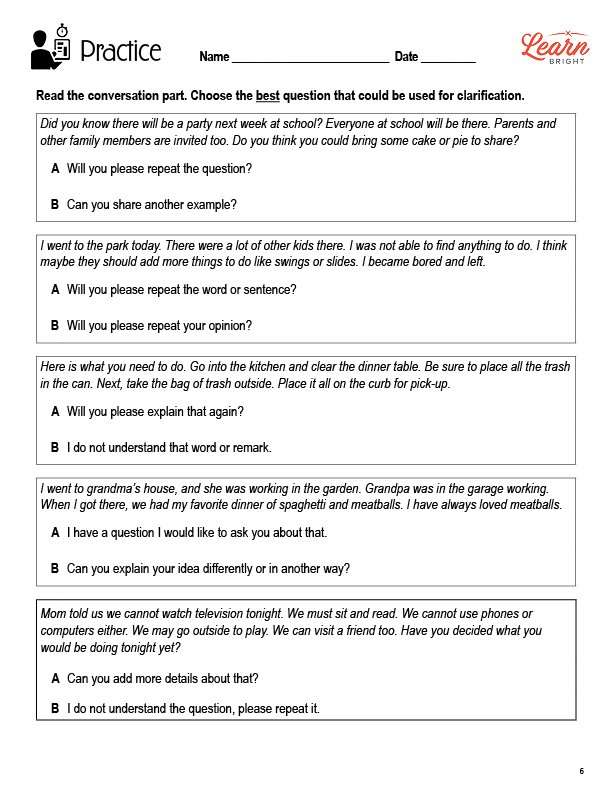
Asking for Clarification YouTube
Here is a list of useful English phrases you can use to express lack of understanding (that is, when you fail to understand what has been said to you) and seek clarification from the person you are talking to. How to express lack of understanding When you fail to understand what has been said to you you can use these expressions: I beg your pardon?

Here’s How to Ask for Clarification From Someone Else
As an English teacher, part of your role is to help students overcome cultural barriers when expressing themselves. If students have never learned how to politely ask for clarification, you'll need to teach them courteous English expressions and when to use them.

Here’s How to Ask for Clarification From Someone Else
After teaching the various ways to ask for clarification, have students practice several of these phrases in role plays. Suggested role plays:. That's 4,036 pages filled with thousands of practical activities and tips that you can start using today. 30-day money back guarantee. Learn more. Popular articles like this. That Will Be 14.50; Here.

️Asking For Clarification Worksheet Free Download Gmbar.co
Looking for clarification? Use one of our 9 samples to ask for clarification in an email. Lawrie Jones Writer How to write a clarification email Need help nailing down some details about a person, product, project, or appointment? You need to create a clarification email.

Asking for Clarification for Better Communication YouTube
Asking for Clarification: Understanding the Message CLB Level(s): 3-4 CLB Skill(s): Speaking, Listening, Reading Essential Skill(s): Oral Communication, Working with others Activity 1: Determining Appropriate Language Used to Interrupt and Ask for Clarification 1. Distribute Appendix 1.1 2.

Asking for Clarification, Free PDF Download Learn Bright
1. Would You Mind Providing More Details? You can start by saying "would you mind providing more details?" This is a direct and honest way to let someone know you'd like to learn more information. Generally, you can use it when writing to your boss. Let's say they've set you a task, but you're not quite sure how to go about it.

Clarification
When you ask someone for clarification, you are asking them to say something in a different way or provide more information so that you understand them better. This is different from asking.

Asking for Clarification, Free PDF Download Learn Bright
1 Checking/ clarifying trivia quizzes Make a general knowledge quiz in which all the questions can also be used in normal communication such as "How do you spell giraffe?", "Does rush hour mean a race?" and "Can you give me an example of an ape?"

Requesting Clarification Distance learning, Auditory learning
Description: These activities provide a structured way to encourage a student to be able to ask for clarification, help or for information to be repeated. Student who have speech, language and communication needs can find it hard to know when to ask for help and how to do it. Strategies:

Assignment 1 clarification
ask for clarification using the following expressions: What do you mean by…? Do you mean…? (and then state what you think they meant) Could you say that again, please? Could you clarify that please? Could you be more explicit?

Asking for Clarification Learn Bright
When it comes to the proper format for asking a clarification question or seeking clarification, the key is to use basic rules of etiquette. Using phrases such as "I'm sorry" or "Excuse me" when asking for clarification indicates a participatory tone that simply seeks better understanding. Further, using the conditional mood also.

Asking for clarification stock photo. Image of looking 13267142
Clarifying involves: Non-judgemental questioning. Summarising and seeking feedback as to its accuracy. Clarification Questions When you are the listener in a sensitive environment, the right sort of non-directive questioning can enable the speaker to describe their viewpoint more fully.

Value Clarification Google Search Textbook, Handouts, Reading
Asking for Clarification Functional English Int All ages Grades 9-12 Students review language and useful expressions for clarifying and asking for clarification. They play a modified game of broken telephone and perform a skit. They also review how to use tag questions. Assessment tasks and tools are available at the end of this lesson.

5 Polite Phrases to Use When Asking For Clarification
1. I Would Like to Clarify With You Regarding It's wise to be clear and direct when asking for clarification. The more obvious you are, the easier it is for the reader to follow what you're saying. That's why we think "I would like to clarify with you regarding" is such a great alternative.

Speaking Lesson and Activities for Beginner Adult ESL and High School
If you need to ask for clarification, it means that you don't understand what someone told you and you need a more detailed explanation. Here are some useful phrases to use in these situations: I'm afraid I don't quite understand. I don't think I get you. I'm not sure I understand.

Asking for clarification YouTube
You can ask for clarification by: Expressing a lack of understanding. Checking your current understanding of something. Asking someone to repeat something you didn't understand. Requesting further information to clarify a topic. We'll cover all these different scenarios in our examples in a moment.